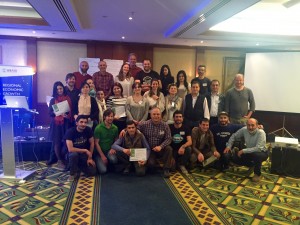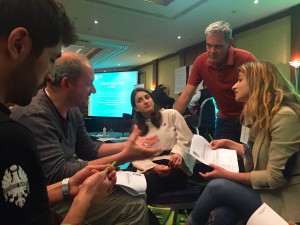
In cooperation with the USAID Missions in Armenia and Georgia, the Adventure Travel Trade Association visited Georgia and Armenia last fall to assess the readiness of adventure tourism in the region by investigating the levels of public-private-NGO sector cooperation, understanding locals’ perspectives and identifying the most apparent needs and opportunities required for responsible adventure/alternative tourism development – especially cross-border activity – in the region.
Responding to the region’s interests, the ATTA, USAID-REG (Regional Economic Growth Project) and public and private sector presented the region’s first AdventureEDU two-day training program presented by Jack Delf – Black Mountain Adventures, Dan Moore – Pandion Consulting, and Chris Doyle - ATTA.
Among the 30+ participants (approximately half were from Armenia, half from Georgia, and one from Turkey), the topics of Adventure Tourism Product Development, Community Builder, and Selling Successfully to International Trade Partners components struck the right chord. Participants largely represented regional ground operators largely focused on single destination operators, all of which represented varying levels of maturation in the world of tourism.
After establishing a common-frame of understanding for the scope of adventure travel and the type of travellers representing this sector, the product development training program stimulated immediate awareness, understanding and openness to adoption, which resulted in some compelling group exercises. Instructors observed that participants were open to pursue more creative solutions, understood the need to diversify the region’s product offering and to partner with neighboring countries, aware of the need to retain originality and authenticity and committed to focus on higher value, premium product development (vs. developing products that compete on price).
Key content that resonated with participants provided better understanding of the nuances of the international adventure traveller and what their hopes, needs and expectations are and that more specialized, tailored marketing is essential – not just to the trade, but to travellers themselves. This heightened awareness opened up the doors to many conversations throughout the two days.
Most participants’ experiences until the delivery of this AdventureEDU were almost entirely focused on individual company pursuits. During the course of the two-day program, a discernible metamorphosis transpired: people opened up, shared and leaned into the program, displaying a readiness to enter the international market in very real terms. While it took a while for the room to warm up, by the end of day two, it was clear that virtually all participants took this concept to heart and mind. In fact, so much so, that partnerships were being formed during the program.

“During this EDU we found our possible partnership with Turkey,” said one participant. “We discussed several opportunities to put Armenia, Georgia and Turkey together in a combination of one and the same tour.”
Due to the current situation in Turkey, and fairly recently the events in Armenia, such partnerships may suffer from short-term delays in specific activities. Still, early discussions are key to setting the stage for future collaboration when the “dust settles” in these specific destinations.
Delegates also frequently expressed that they were energised, enthusiastic and more knowledgeable of adventure travel concepts, confident in approaching inbound tour operators and ready to innovate new products and experiences for guests.
The Capstone project, which required that participants draw from training modules from throughout both days, was an effective culmination. Trainers were definitely impressed with the diversity of new thinking and new activities presented -- spanning the whole region and with some very creative components. Additional remedial work will be needed on itinerary design, but this was secondary to the fact that participants were working collaboratively.
Based on program participants’ and observers’ favorable feedback, the ATTA is being asked to return to the Caucasus this fall (2016) to further develop the regional community, and to deliver programs on guide training, safety and risk management, and product design, development and innovation. Discussions are currently under way.
